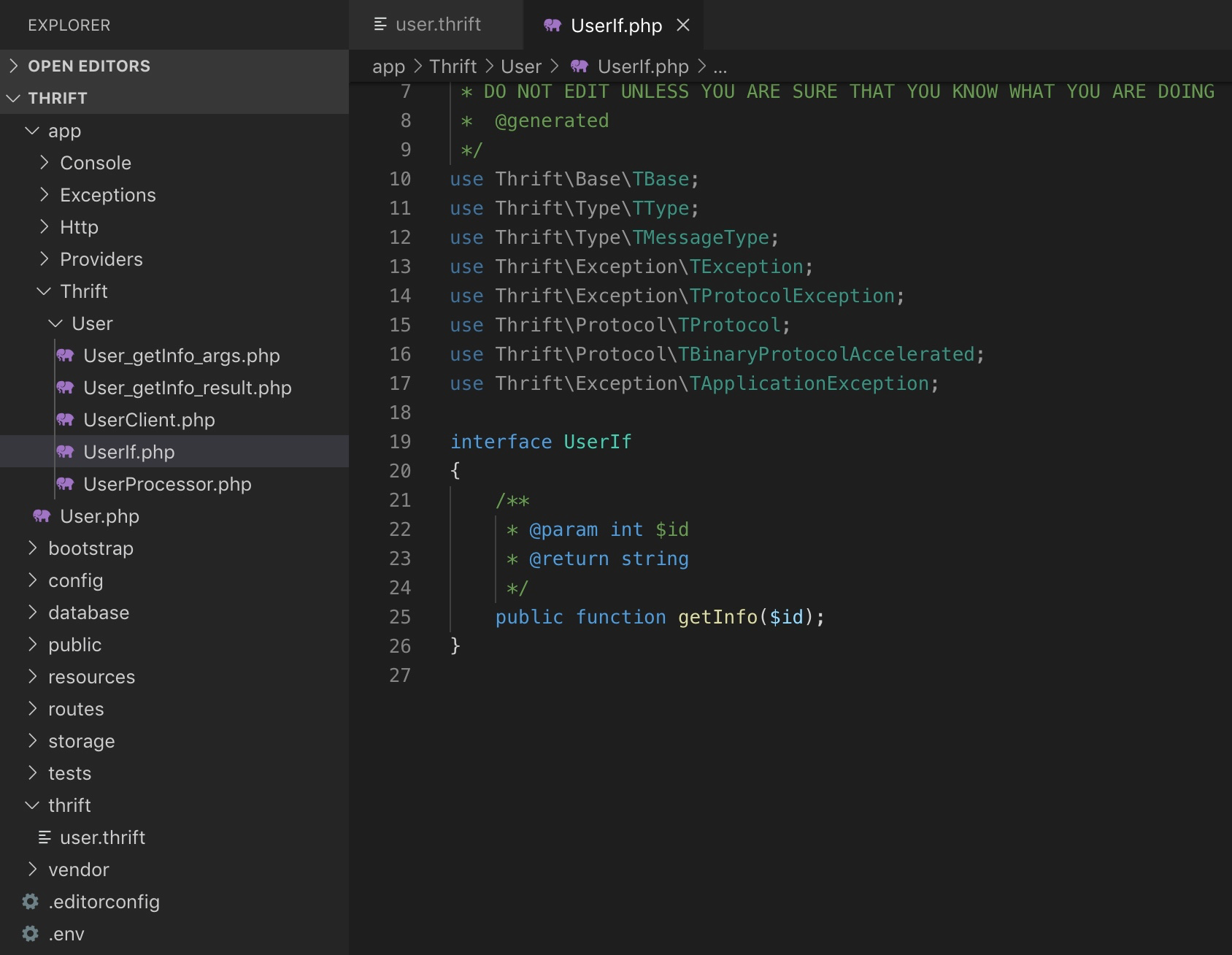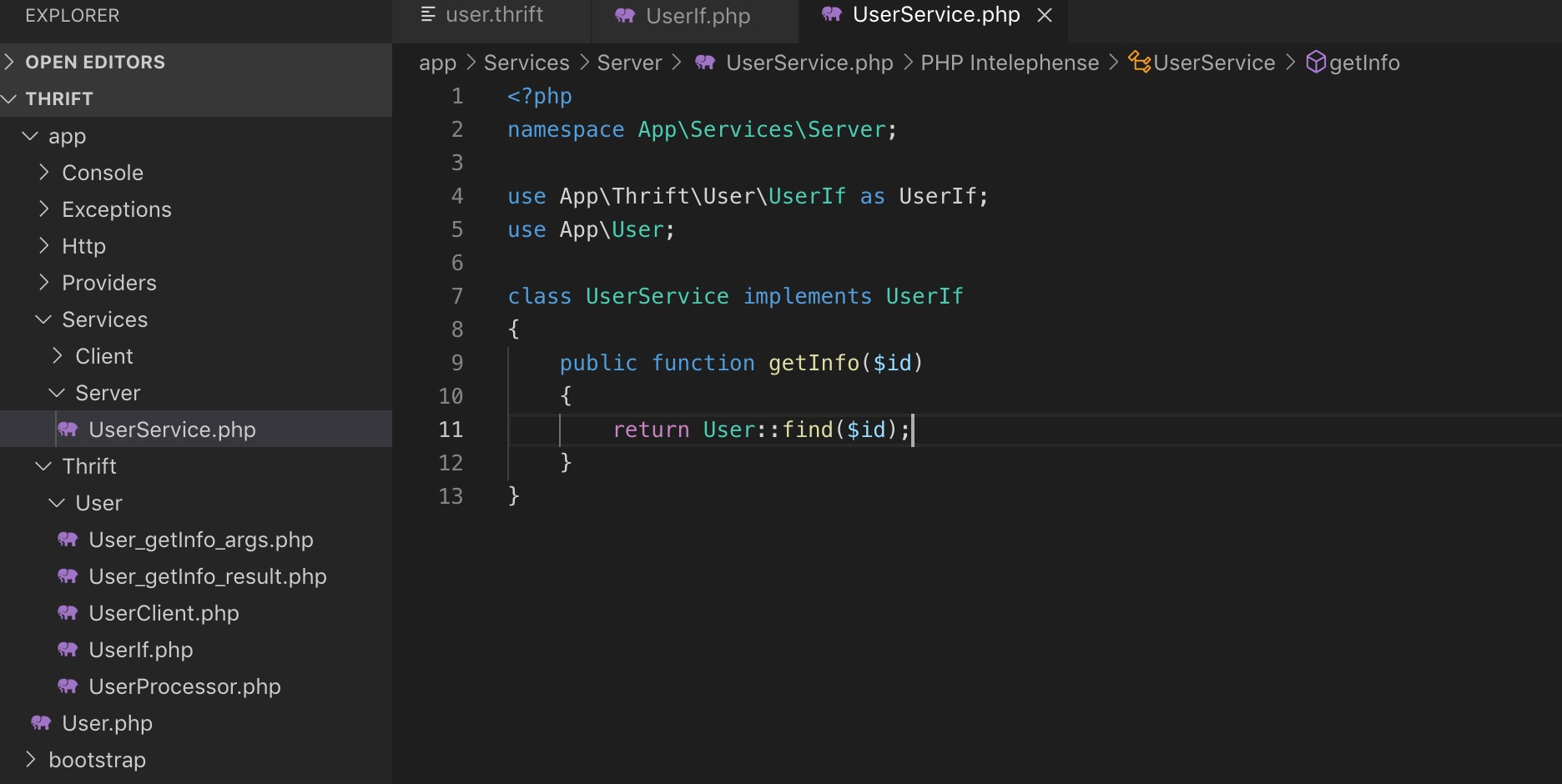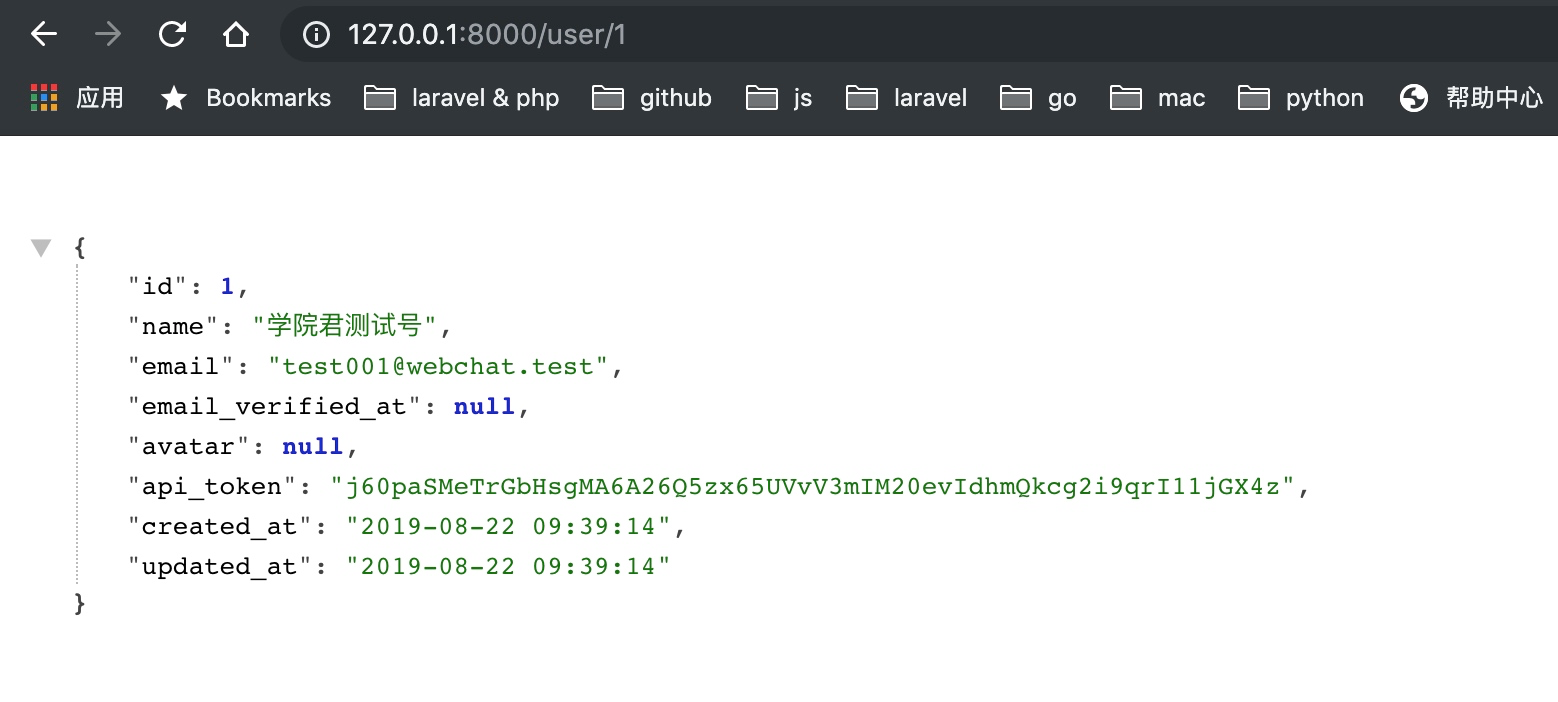微服务架构系列 - 增补篇:基于 Thrift + Laravel 构建微服务(一)
- 4 mins微服务架构系列(三十八)
简单介绍了 Thrift 框架,本周学院君将会花几个篇幅的教程来介绍如何基于 Thrift + Laravel 构建微服务接口。
项目初始化
为此,我们先初始化一个新的 Laravel 应用 thrift:
laravel new thrift
在 thrift 项目根目录下新增一个 thrift 子目录,然后在该子目录下创建 Thrift IDL 文件 user.thrift,用于定义和用户相关的服务接口(语言为 PHP,命名空间为 App\Thrift\User):
namespace php App.Thrift.User
// 定义用户接口
service User {
string getInfo(1:i32 id)
}
接着在项目根目录下运行如下命令,根据上述 IDL 文件生成相关的服务代码:
thrift -r --gen php:server -out ./ thrift/user.thrift
这样就会在 App\Thrift\User 命名空间下生成对应的服务代码:

然后通过 Composer 安装 Thrift PHP 依赖包:
composer require apache/thrift
编写 RPC 服务端代码
接下来,我们就可以编写服务端代码了,在 app 目录下新建一个 Services/Server 子目录,然后在该目录下创建服务接口类 UserService,该类实现自 App\Thrift\User\UserIf 接口:

在服务接口实现中,我们通过传入参数查询数据库并返回对应的记录,这里为了简化逻辑,我们直接调用模型类查询记录并直接返回,将参数校验、缓存优化、异常处理通通省略。
接下来,我们来编写服务端启动命令类,在 Laravel 框架中,这可以通过 Artisan 控制台来完成,首先创建命令类:
php artisan make:command RpcServerStart
该命令会在 app/Console/Commands 目录下生成 RpcServerStart.php,我们编写 RpcServerStart 命令类代码如下:
<?php
namespace App\Console\Commands;
use App\Services\Server\UserService;
use App\Thrift\User\UserProcessor;
use Illuminate\Console\Command;
use Thrift\Exception\TException;
use Thrift\Factory\TBinaryProtocolFactory;
use Thrift\Factory\TTransportFactory;
use Thrift\Server\TServerSocket;
use Thrift\Server\TSimpleServer;
use Thrift\TMultiplexedProcessor;
class RpcServerStart extends Command
{
/**
* The name and signature of the console command.
*
* @var string
*/
protected $signature = 'rpc:start';
/**
* The console command description.
*
* @var string
*/
protected $description = 'Start Thrift RPC Server';
/**
* Create a new command instance.
*
* @return void
*/
public function __construct()
{
parent::__construct();
}
/**
* Execute the console command.
*
* @return mixed
*/
public function handle()
{
try {
$thriftProcess = new UserProcessor(new UserService());
$tFactory = new TTransportFactory();
$pFactory = new TBinaryProtocolFactory();
$processor = new TMultiplexedProcessor();
// 注册服务
$processor->registerProcessor('UserService', $thriftProcess);
// 监听本地 8888 端口,等待客户端连接请求
$transport = new TServerSocket('127.0.0.1', 8888);
$server = new TSimpleServer($processor, $transport, $tFactory, $tFactory, $pFactory, $pFactory);
$this->info("服务启动成功[127.0.0.1:8888]!");
$server->serve();
} catch (TException $exception) {
$this->error("服务启动失败!");
}
}
}
别忘了在 app/Console/Kernel.php 中注册上述命令类使其生效:
use App\Console\Commands\RpcServerStart;
protected $commands = [
RpcServerStart::class,
];
这样,服务端接口和启动命令都已经完成了,接下来我们继续编写客户端建立连接和请求通信代码。
编写 RPC 客户端代码
这个客户端并不是前端、移动端,而是相对于 RPC 服务器的 RPC 客户端,我们在 app/Services/Client 目录下创建 UserService.php,用于存放 RPC 客户端连接与请求服务接口方法:
<?php
namespace App\Services\Client;
use App\Thrift\User\UserClient;
use Thrift\Protocol\TMultiplexedProtocol;
use Thrift\Exception\TException;
use Thrift\Protocol\TBinaryProtocol;
use Thrift\Transport\TBufferedTransport;
use Thrift\Transport\TSocket;
class UserService
{
public function getUserInfo(int $id)
{
try {
// 建立与 RpcServer 的连接
$socket = new TSocket("127.0.0.1", "8888");
$socket->setRecvTimeout(30000); // 超时时间
$socket->setDebug(true);
$transport = new TBufferedTransport($socket, 1024, 1024);
$protocol = new TBinaryProtocol($transport);
$thriftProtocol = new TMultiplexedProtocol($protocol, 'UserService');
$client = new UserClient($thriftProtocol);
$transport->open();
$result = $client->getInfo($id);
$transport->close();
return $result;
} catch (TException $TException) {
dd($TException);
}
}
}
同样,为了简化代码和流程,我这里将连接和请求代码写到一起了,如果有多个服务接口,传输层是可以共用的,需要拆分开。这里我们先建立与 RPC 服务器的连接,然后通过调用 App\Thrift\User\UserClient 提供的 getInfo 请求 RPC 服务端 App\Services\Server\UserService 类提供的 getInfo 方法获取用户信息并返回。
最后,我们在 routes/web.php 中注册客户端请求路由:
use App\Services\Client\UserService;
Route::get('/user/{id}', function($id) {
$userService = new UserService();
$user = $userService->getUserInfo($id);
return $user;
});
该路由通过匿名函数定义了路由处理逻辑:调用 App\Services\Client\UserService 的 getUserInfo 方法获取用户信息。需要与传统的 PHP 请求处理区分的是,这个请求底层不是在本地通过内存调用完成的,而是通过 RPC 客户端请求 RPC 服务端接口基于远程服务调用完成的。
测试 RPC 远程服务调用
至此,RPC 客户端和服务端代码都已经编写好了,接下来我们来测试这个 RPC 接口调用。
修改项目根目录下 .env 中的数据库相关配置,运行数据迁移生成 users 表:
php artisan migrate
然后初始化 users 表数据:

接下来,在项目根目录下启动 Thrift RPC 服务端:
php artisan rpc:start

再新开一个终端窗口启动 Laravel 应用(RPC 客户端):
php artisan serve

然后就可以在浏览器中访问获取用户信息的路由:

成功获取到用户记录,说明 RPC 远程服务调用成功。
可以看到,Thrift 只是个 RPC 框架而已,只解决了通信协议和数据传输问题,对于服务治理和容错并没有提供对应的解决方案,需要我们自己去实现,而且基于 PHP 实现的服务器在高并发情况下可能无法满足微服务接口的性能要求,后面我们将从这几个方面来完善这个示例应用。